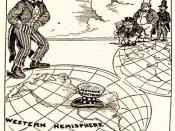The first foreign policy of the United States was neutrality. Just overcoming the English and getting liberty, the US faced the difficult undertaking of forming a new country. In an attempt to protect themselves from taking part in the quarrels of the Europeans and focusing on domestic affairs, a path of neutrality was followed. The roots of this first strategy can be seen as early as the administration of George Washington.
Soon after Washington's inauguration in 1789, the French Revolution began. As the revolution deepened and became bloodier, the English wanted to utilize the weakness of the French government. While disagreement between the French and English greatened, America was trapped in the center. American loyalties were separated among the French who had aided in America's revolution and the English to whom cultural and economic ties were greatest. Washington resolved that impartiality was the best course, thereby keeping out of the war on the whole.
When he departed office in 1796 after serving two terms as president, Washington gave a farewell address overflowing with advice and cautions to the young nation. While he also warned against the divisive problems of political parties, it was his call for neutrality and avoiding alliances that set the course of US foreign policy.
Washington warned the nation to stay away of enduring alliances, remarking that even provisional treaties or alliances were satisfactory only under urgent situations. It was this attitude set by Washington's words and his presidency that established neutrality as the first foreign policy of the United States.
President Monroe's address to Congress in 1832 marked a major landmark in US foreign policy. The Monroe Doctrine as it became known was meant as a caution to the countries of Europe to end the colonization of the Western Hemisphere. The doctrine stated that the...


